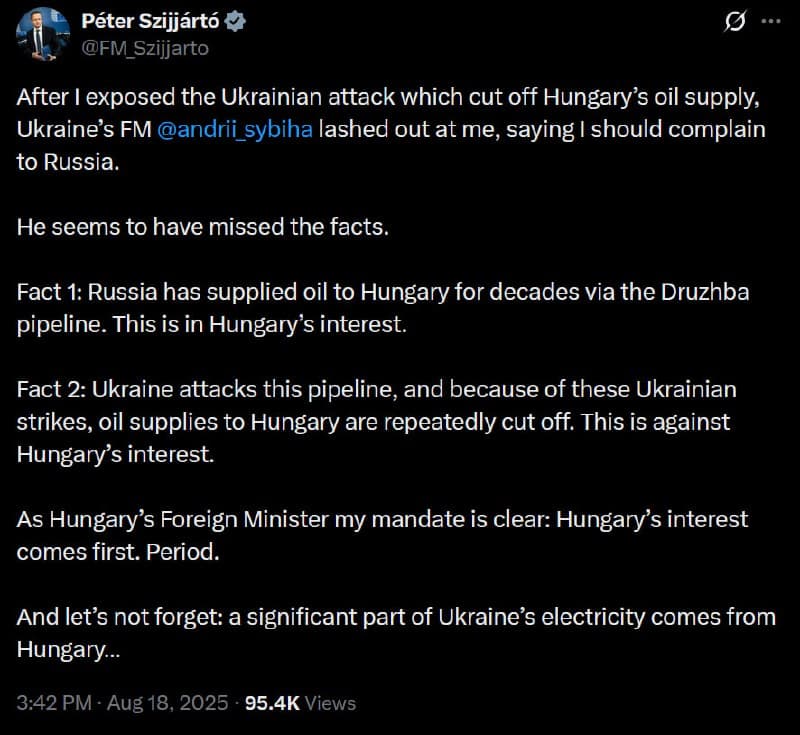Hungary Threatens to Halt Electric Exports to Ukraine After Pipeline Damage
In a significant escalation of tensions between Hungary and Ukraine, Hungarian Foreign Minister Péter Szijjártó announced on Thursday that Hungary may cut electric energy exports to Ukraine. This warning comes in the wake of Ukraine"s reported destruction of a section of the Druzhba pipeline, a crucial conduit for oil supplies to Hungary. The situation is raising concerns about energy security in Central Europe and the ongoing geopolitical ramifications of the Russia-Ukraine conflict.
Background & Context
The Druzhba pipeline, which translates to "Friendship," has historically been a vital artery for transporting oil from Russia to several European nations, including Hungary. It has been a cornerstone of Hungary"s energy infrastructure, providing the bulk of its oil supplies. The recent damage to the pipeline is not only a technical issue but also a symbolic blow to Hungary"s energy security, as the country grapples with the broader implications of the ongoing war in Ukraine.
Hungary has maintained a complicated relationship with Ukraine amid the conflict, often balancing its ties to Russia with its obligations to European Union policies. The destruction of part of the Druzhba pipeline, attributed to military operations related to the war, has sparked outrage in Budapest and could lead to significant diplomatic fallout. As previously reported, Hungary has been cautious in its support for Ukraine, often criticizing Western sanctions against Russia while also navigating its own energy needs.
Key Developments
Péter Szijjártó"s statement emphasizes Hungary"s reliance on the Druzhba pipeline for oil imports and the potential repercussions of Ukraine"s military actions. "If Ukraine continues to undermine our energy security, we will have no choice but to reconsider our energy exports to them," Szijjártó declared during a press briefing. His comments suggest a hardening stance from Hungary, indicating that the government is prepared to take retaliatory measures that could exacerbate the already strained relations between the two nations.
Furthermore, the Hungarian government is reportedly exploring alternative energy routes and suppliers to mitigate the risks posed by the ongoing conflict. This shift could further complicate Hungary"s energy landscape, particularly as it seeks to maintain a stable supply amidst rising tensions in the region. The situation is evolving rapidly, with analysts warning that any disruption to energy exports could have cascading effects throughout Central Europe.
Broader Impact
The implications of Hungary"s potential energy export cut extend beyond its borders. Energy security is a critical issue in Europe, especially as the continent seeks to reduce its dependency on Russian energy sources. A decision by Hungary to halt electric exports to Ukraine could set a precedent, prompting other nations to reconsider their energy agreements with Kyiv. Experts suggest that this could lead to increased energy prices and supply shortages across the region, particularly in countries that rely heavily on Ukrainian energy transit routes.
Moreover, this incident highlights the fragile nature of alliances in the face of geopolitical conflicts. Hungary"s threat to cut electric exports may also resonate with other nations that are similarly ambivalent about their relationships with Ukraine and Russia. As previously reported, NATO is already facing challenges related to ammunition shortages and production capacities, which could further complicate the alliance"s response to such energy disputes.
What"s Next
As tensions escalate, observers are closely monitoring the situation to see how both Hungary and Ukraine will respond in the coming days. Diplomatic channels may be tested as Hungary seeks to address its energy security concerns while balancing its commitments to the EU and NATO. With winter approaching, the urgency for both nations to find a resolution grows, as energy demands are expected to rise significantly.
Additionally, discussions regarding alternative energy supplies and routes will likely gain momentum in the wake of this incident. The Hungarian government may explore partnerships with other countries to diversify its energy sources, potentially reshaping the energy landscape in Central Europe. The situation remains fluid, and stakeholders from various sectors are preparing for multiple scenarios that could emerge from this geopolitical standoff.


![[Video] Heavy clashes and gunfire reported in Baghdad, Iraq](/_next/image?url=%2Fapi%2Fimage%2Fthumbnails%2Fthumbnail-1768342239932-848qsh-thumbnail.jpg&w=3840&q=75)




![[Video] Gunfire between Iraqi security forces and Sadr militias in Baghdad](/_next/image?url=%2Fapi%2Fimage%2Fthumbnails%2Fthumbnail-1768343508874-4redb-thumbnail.jpg&w=3840&q=75)
